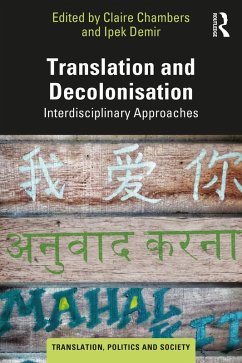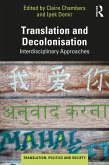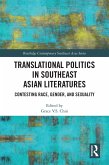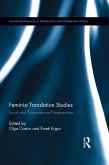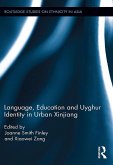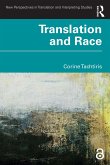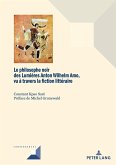Translation and Decolonisation (eBook, PDF)
Interdisciplinary Approaches
Redaktion: Chambers, Claire; Demir, Ipek
40,95 €
40,95 €
inkl. MwSt.
Sofort per Download lieferbar

20 °P sammeln
40,95 €
Als Download kaufen

40,95 €
inkl. MwSt.
Sofort per Download lieferbar

20 °P sammeln
Jetzt verschenken
Alle Infos zum eBook verschenken
40,95 €
inkl. MwSt.
Sofort per Download lieferbar
Alle Infos zum eBook verschenken

20 °P sammeln
Translation and Decolonisation (eBook, PDF)
Interdisciplinary Approaches
Redaktion: Chambers, Claire; Demir, Ipek
- Format: PDF
- Merkliste
- Auf die Merkliste
- Bewerten Bewerten
- Teilen
- Produkt teilen
- Produkterinnerung
- Produkterinnerung

Bitte loggen Sie sich zunächst in Ihr Kundenkonto ein oder registrieren Sie sich bei
bücher.de, um das eBook-Abo tolino select nutzen zu können.
Hier können Sie sich einloggen
Hier können Sie sich einloggen
Sie sind bereits eingeloggt. Klicken Sie auf 2. tolino select Abo, um fortzufahren.

Bitte loggen Sie sich zunächst in Ihr Kundenkonto ein oder registrieren Sie sich bei bücher.de, um das eBook-Abo tolino select nutzen zu können.
Translation and Decolonisation: Interdisciplinary Approaches offers compelling explorations of the pivotal role that translation plays in the complex and necessarily incomplete process of decolonisation.
- Geräte: PC
- mit Kopierschutz
- eBook Hilfe
Andere Kunden interessierten sich auch für
![Translation and Decolonisation (eBook, ePUB) Translation and Decolonisation (eBook, ePUB)]() Translation and Decolonisation (eBook, ePUB)40,95 €
Translation and Decolonisation (eBook, ePUB)40,95 €![Translational Politics in Southeast Asian Literatures (eBook, PDF) Translational Politics in Southeast Asian Literatures (eBook, PDF)]() Translational Politics in Southeast Asian Literatures (eBook, PDF)41,95 €
Translational Politics in Southeast Asian Literatures (eBook, PDF)41,95 €![Feminist Translation Studies (eBook, PDF) Feminist Translation Studies (eBook, PDF)]() Feminist Translation Studies (eBook, PDF)43,95 €
Feminist Translation Studies (eBook, PDF)43,95 €![Language, Education and Uyghur Identity in Urban Xinjiang (eBook, PDF) Language, Education and Uyghur Identity in Urban Xinjiang (eBook, PDF)]() Language, Education and Uyghur Identity in Urban Xinjiang (eBook, PDF)47,95 €
Language, Education and Uyghur Identity in Urban Xinjiang (eBook, PDF)47,95 €![Translation and Race (eBook, PDF) Translation and Race (eBook, PDF)]() Corine TachtirisTranslation and Race (eBook, PDF)31,95 €
Corine TachtirisTranslation and Race (eBook, PDF)31,95 €![The Routledge Handbook of Translation and Migration (eBook, PDF) The Routledge Handbook of Translation and Migration (eBook, PDF)]() The Routledge Handbook of Translation and Migration (eBook, PDF)45,95 €
The Routledge Handbook of Translation and Migration (eBook, PDF)45,95 €- -7%11
![Le philosophe noir des Lumières Anton Wilhelm Amo à travers la fiction littéraire (eBook, PDF) Le philosophe noir des Lumières Anton Wilhelm Amo à travers la fiction littéraire (eBook, PDF)]() Constant Kpao SarèLe philosophe noir des Lumières Anton Wilhelm Amo à travers la fiction littéraire (eBook, PDF)41,95 €
Constant Kpao SarèLe philosophe noir des Lumières Anton Wilhelm Amo à travers la fiction littéraire (eBook, PDF)41,95 € -
-
-
Translation and Decolonisation: Interdisciplinary Approaches offers compelling explorations of the pivotal role that translation plays in the complex and necessarily incomplete process of decolonisation.
Dieser Download kann aus rechtlichen Gründen nur mit Rechnungsadresse in A, B, BG, CY, CZ, D, DK, EW, E, FIN, F, GR, HR, H, IRL, I, LT, L, LR, M, NL, PL, P, R, S, SLO, SK ausgeliefert werden.
Produktdetails
- Produktdetails
- Verlag: Taylor & Francis
- Seitenzahl: 244
- Erscheinungstermin: 31. Mai 2024
- Englisch
- ISBN-13: 9781040028285
- Artikelnr.: 70588171
- Verlag: Taylor & Francis
- Seitenzahl: 244
- Erscheinungstermin: 31. Mai 2024
- Englisch
- ISBN-13: 9781040028285
- Artikelnr.: 70588171
- Herstellerkennzeichnung Die Herstellerinformationen sind derzeit nicht verfügbar.
Claire Chambers is Professor of Global Literature at the University of York, where she teaches twentieth- and twenty-first-century writing in English from South Asia, the Perso-Arab world, and their diasporas. Her books include Imagining Muslims in South Asia and the Diaspora, Britain Through Muslim Eyes, and Making Sense of Contemporary British Muslim Novels . Ipek Demir is Professor of Diaspora Studies and Director of the Centre for Ethnicity and Racism Studies (CERS) at the University of Leeds. Her publications span race, diaspora, migration, decoloniality, and interdisciplinarity. Her research has been funded by the EU, ESRC, and AHRC. She is also the author of Diaspora as Translation and Decolonisation (2022).
Acknowledgements Claire Chambers and Ipek Demir, Introduction: Translation in the Service of (De)colonisation 1: Gayatri Chakravorty Spivak, Translating into English 2: Kathryn Batchelor, Decolonial and Postcolonial Perspectives on Translation: Compatibilities and Contradictions 3: Paul F. Bandia, Reparative Translation, Decoloniality, Metacoloniality 4: Tejaswini Niranjana, Feminism and Translation in India 5: Abdelmajid Hannoum, On Translation Ideology 6: Claire Chambers, Forked Tongues: Translation and (De)colonisation in Two Global Novels by Contemporary Women Writers 7: Sara de Jong, Armed with Words: (De)colonising Translation in the US-led NATO war in Afghanistan (2001-2021) 8: Encarnación Gutiérrez Rodríguez, Translation as Decolonial Method: On the (Un)Translatability of Human Rights Demands and the Coloniality of Migration in Refugee Protest in Germany 9: Haider Shahbaz, Fahmida Riaz's
w
z: Translation and Solidarities in the Global South 10: Peiyu Yang, Translating the Other: Ghassan Kanafani's Travelogue ... And Then Arose Asia 11: Gargi Binju, Writing Diasporic In-Betweenness: South Asians in Colonial and Postcolonial East Africa in the Novels of M. G. Vassanji 12: Maureen Freely, Translation as Activism, Translators as Activists 13: Ng
g
wa Thiong'o, Finding Our Way: Dialogue Among Our Languages Is the Way to the Unity of African Peoples
w
z: Translation and Solidarities in the Global South 10: Peiyu Yang, Translating the Other: Ghassan Kanafani's Travelogue ... And Then Arose Asia 11: Gargi Binju, Writing Diasporic In-Betweenness: South Asians in Colonial and Postcolonial East Africa in the Novels of M. G. Vassanji 12: Maureen Freely, Translation as Activism, Translators as Activists 13: Ng
g
wa Thiong'o, Finding Our Way: Dialogue Among Our Languages Is the Way to the Unity of African Peoples
Acknowledgements Claire Chambers and Ipek Demir, Introduction: Translation in the Service of (De)colonisation 1: Gayatri Chakravorty Spivak, Translating into English 2: Kathryn Batchelor, Decolonial and Postcolonial Perspectives on Translation: Compatibilities and Contradictions 3: Paul F. Bandia, Reparative Translation, Decoloniality, Metacoloniality 4: Tejaswini Niranjana, Feminism and Translation in India 5: Abdelmajid Hannoum, On Translation Ideology 6: Claire Chambers, Forked Tongues: Translation and (De)colonisation in Two Global Novels by Contemporary Women Writers 7: Sara de Jong, Armed with Words: (De)colonising Translation in the US-led NATO war in Afghanistan (2001-2021) 8: Encarnación Gutiérrez Rodríguez, Translation as Decolonial Method: On the (Un)Translatability of Human Rights Demands and the Coloniality of Migration in Refugee Protest in Germany 9: Haider Shahbaz, Fahmida Riaz's
w
z: Translation and Solidarities in the Global South 10: Peiyu Yang, Translating the Other: Ghassan Kanafani's Travelogue ... And Then Arose Asia 11: Gargi Binju, Writing Diasporic In-Betweenness: South Asians in Colonial and Postcolonial East Africa in the Novels of M. G. Vassanji 12: Maureen Freely, Translation as Activism, Translators as Activists 13: Ng
g
wa Thiong'o, Finding Our Way: Dialogue Among Our Languages Is the Way to the Unity of African Peoples
w
z: Translation and Solidarities in the Global South 10: Peiyu Yang, Translating the Other: Ghassan Kanafani's Travelogue ... And Then Arose Asia 11: Gargi Binju, Writing Diasporic In-Betweenness: South Asians in Colonial and Postcolonial East Africa in the Novels of M. G. Vassanji 12: Maureen Freely, Translation as Activism, Translators as Activists 13: Ng
g
wa Thiong'o, Finding Our Way: Dialogue Among Our Languages Is the Way to the Unity of African Peoples
